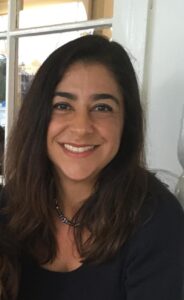Introduction to the Principles of EMDR Therapy
Date/Time
Date(s) - 08/20/2022
9:00 am - 4:15 pm
About the Course
Christian Counseling Centers presents “Introduction to the Principles of EMDR Therapy” taught by Alicia Avila, LCSW on Saturday, August 20, 2022 from 9 a.m. – 4:15 p.m. via webinar.
Course Description:
This course is an introduction to the principles of EMDR therapy and trauma informed care. This course does not train a practitioner in EMDR Therapy. The course will review the training standards for official evidence based EMDR therapy. This course will review the history and evolution of EMDR therapy from a desensitization technique to the evidence based full integrative therapy approach taught today. The main paradigm shift will be illustrated by reviewing the principles, the model that informs EMDR, the neurobiological underpinnings and clinical findings.
Educational Goals:
This course will review what constitutes trauma; from the DSM criteria of PTSD to what the research shows of the impact of adverse life events. The research behind the neurobiology of trauma and stress is reviewed. The effects of racism and other marginalization is described as well as the implications for treatment.
Participants will learn about the impact of “adverse community events” that can cause symptoms of PTSD. Adverse community experiences of discrimination and marginalization set up the groundwork for health consequences, self-esteem and identity. Posts on social media can trigger past experiences of marginalization, lack of belonging and threat to our need for community and safety. Using a more wholistic or bottom-up approach to access points of disturbance can aid in working with diverse populations that present with more somatic symptoms. For multilingual individuals inviting the client’s use of various language can help to access emotions or memories that may be encoded in language. Clinicians’ ability to check in with their client around perceived differences in ethnicity, age, disability, gender can help open the door to reveal additional life experiences that may be relevant for trauma work and for the therapeutic rapport.
An overview of the protocol consisting of the 8 phases of EMDR therapy treatment and its 3 prongs. A brief video clip will illustrate some of the principles of EMDR reprocessing such as dual attention and intermittent use of dual attention bilateral stimulation. Aspects of phases one and two will be explained with a brief demonstration of a phase 2 exercise. A consideration for the use of techniques that are part of EMDR phases one and two for non EMDR clinicians to use as part of trauma informed care will be illustrated.
Measurable Learning Objectives:
- Participants will be able to identify approved EMDR training courses
- Participants will be able to name the 3 prongs of EMDR therapy
- Participants will be able to identify the phases of EMDR therapy
- Participants will be able to idenitfy 3 examples of events that might produce PTSD symptoms while not adhering to DSM PTSD criteria
Course meets the qualifcations for 6 hours of continuing education credit for LMFTs, LCSWs, LPCCs, and/or LEPs as required by the California Board of Behavioral Sciences.
Christian Counseling Centers is approved by the California Association of Marriage and Family Therapists to sponsor continuing education for LMFTs, LCSWs, LPCCs, and/or LEPs (#64926). Christian Counseling Centers maintains responsibility for this program/course and its content.
About the Presenter

Alicia Avila MSW, LCSW is a psychotherapist in private practice treating adults with a specialty in trauma, culture, LGBTQI and related issues of marginalization. Ms. Avila has over 25 years of experience in the field and has been a teacher and trainer for local and national institutions and conferences. Alicia Avila, LCSW is an EMDR Institute trainer, EMDRIA approved consultant, and psychotherapist specializing in trauma and cultural issues.
Ms. Avila was a clinical instructor for the UCSD department of psychiatry, school of medicine. She was the program manager for the UCSD Co-Occurring Disorders Program leading a multidisciplinary treatment team of psychiatrists, psychologists, social workers, marriage and family therapists, and recovery counselors providing integrated treatment within a community behavioral health clinic. She is a contributing author of A Dual Diagnosis Demonstration Project: Treatment Outcomes and Cost Analysis published in the Journal of Psychoactive Drugs in 2003. Ms. Avila is bilingual and bicultural as an immigrant, originally from Mexico City.
Course Schedule
9:00 a.m. – 10:30 a.m. Session #1
10:30 a.m. – 10:45 a.m. Break
10:45 a.m. – 12:15 p.m. Session #2
12:15 p.m. – 1:00 p.m. Lunch
1:00 p.m. – 2:30 p.m. Session #3
2:30 p.m. – 2:45 p.m. Break
2:45 p.m. – 4:15 p.m. Session #4
Time spent on breaks (including meal breaks) are not offered for continuing education credit. Course completion certificates will be awarded when participants sign-in/sign-out sheet, course evaluation and self-evaluation forms are submitted at the end of the course.
Fees & Payment
The course fee can be paid by check only. Make the check out to Christian Counseling Centers, and mail it to:
CE Program Administrator
1510 Fashion Island Blvd., #110
San Mateo, CA 94404.
Please send payment the day you register.Refunds are only granted if a written cancellation notice is received by the program administrator at least 2 weeks prior to the date of the course.
Special Needs
All requests for accommodations for special needs can be submitted in writing to the program administrator. Upon receiving the written request, the program administrator will make every effort to accommodate the request. A written response from the program administrator will be sent within 2 weeks of receiving the request.
Grievances
All complaints or grievances can be submitted in writing to the program administrator, and/or to the CEPA Program Coordinator. The program administrator will respond in writing to the complaint or grievance within one week of receiving the submission.
Registration
Registration is closed for this event.

